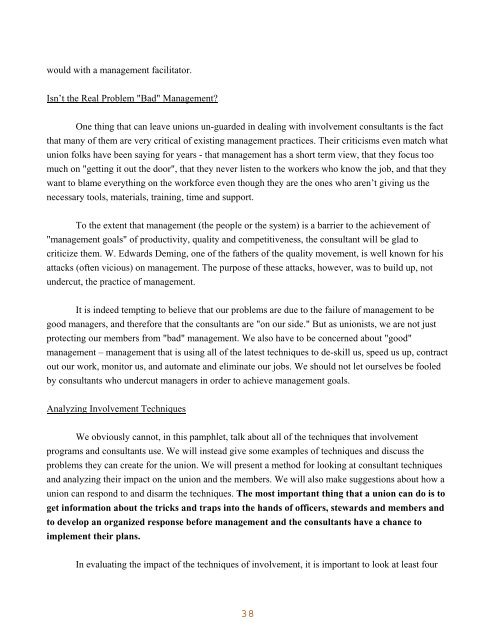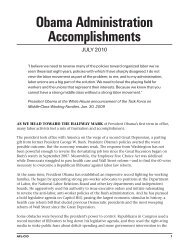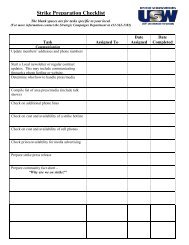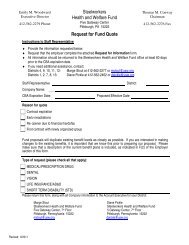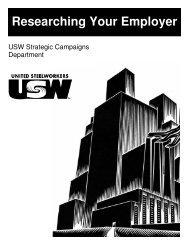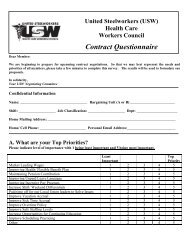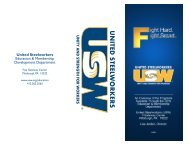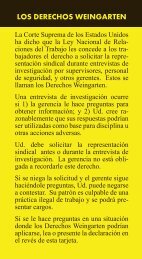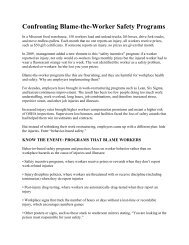Union Approach to Health and Safety: - United Steelworkers
Union Approach to Health and Safety: - United Steelworkers
Union Approach to Health and Safety: - United Steelworkers
You also want an ePaper? Increase the reach of your titles
YUMPU automatically turns print PDFs into web optimized ePapers that Google loves.
would with a management facilita<strong>to</strong>r.<br />
Isn’t the Real Problem "Bad" Management?<br />
One thing that can leave unions un-guarded in dealing with involvement consultants is the fact<br />
that many of them are very critical of existing management practices. Their criticisms even match what<br />
union folks have been saying for years - that management has a short term view, that they focus <strong>to</strong>o<br />
much on "getting it out the door", that they never listen <strong>to</strong> the workers who know the job, <strong>and</strong> that they<br />
want <strong>to</strong> blame everything on the workforce even though they are the ones who aren’t giving us the<br />
necessary <strong>to</strong>ols, materials, training, time <strong>and</strong> support.<br />
To the extent that management (the people or the system) is a barrier <strong>to</strong> the achievement of<br />
"management goals" of productivity, quality <strong>and</strong> competitiveness, the consultant will be glad <strong>to</strong><br />
criticize them. W. Edwards Deming, one of the fathers of the quality movement, is well known for his<br />
attacks (often vicious) on management. The purpose of these attacks, however, was <strong>to</strong> build up, not<br />
undercut, the practice of management.<br />
It is indeed tempting <strong>to</strong> believe that our problems are due <strong>to</strong> the failure of management <strong>to</strong> be<br />
good managers, <strong>and</strong> therefore that the consultants are "on our side." But as unionists, we are not just<br />
protecting our members from "bad" management. We also have <strong>to</strong> be concerned about "good"<br />
management – management that is using all of the latest techniques <strong>to</strong> de-skill us, speed us up, contract<br />
out our work, moni<strong>to</strong>r us, <strong>and</strong> au<strong>to</strong>mate <strong>and</strong> eliminate our jobs. We should not let ourselves be fooled<br />
by consultants who undercut managers in order <strong>to</strong> achieve management goals.<br />
Analyzing Involvement Techniques<br />
We obviously cannot, in this pamphlet, talk about all of the techniques that involvement<br />
programs <strong>and</strong> consultants use. We will instead give some examples of techniques <strong>and</strong> discuss the<br />
problems they can create for the union. We will present a method for looking at consultant techniques<br />
<strong>and</strong> analyzing their impact on the union <strong>and</strong> the members. We will also make suggestions about how a<br />
union can respond <strong>to</strong> <strong>and</strong> disarm the techniques. The most important thing that a union can do is <strong>to</strong><br />
get information about the tricks <strong>and</strong> traps in<strong>to</strong> the h<strong>and</strong>s of officers, stewards <strong>and</strong> members <strong>and</strong><br />
<strong>to</strong> develop an organized response before management <strong>and</strong> the consultants have a chance <strong>to</strong><br />
implement their plans.<br />
In evaluating the impact of the techniques of involvement, it is important <strong>to</strong> look at least four


